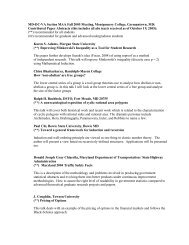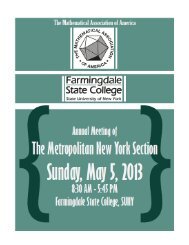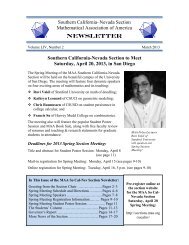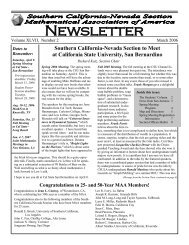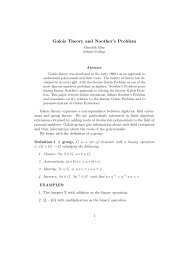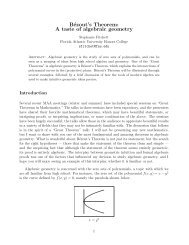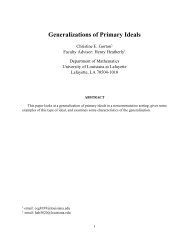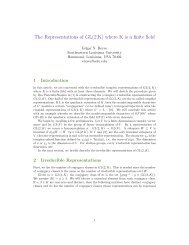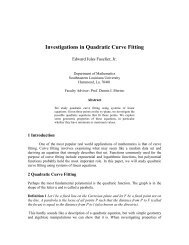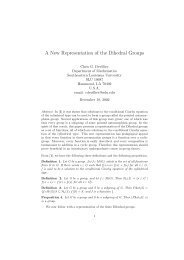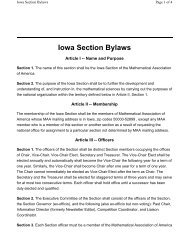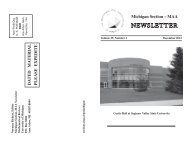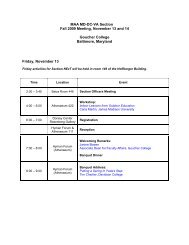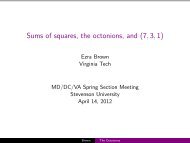2005 Newsletter - MAA Sections - Mathematical Association of ...
2005 Newsletter - MAA Sections - Mathematical Association of ...
2005 Newsletter - MAA Sections - Mathematical Association of ...
You also want an ePaper? Increase the reach of your titles
YUMPU automatically turns print PDFs into web optimized ePapers that Google loves.
The Clearinghouse report focuses less on the quality <strong>of</strong> the curricula than on the quality <strong>of</strong> the<br />
research done to assess the curricula. To be considered adequate documentation, the studies had to<br />
have used randomized research trials so that the test group <strong>of</strong> students could be compared to a<br />
control group. Of 77 studies, the report found that only four fully met these standards, while seven<br />
others “meet evidence standards with reservations.” For the full report, visit What Works web site:<br />
http://www.whatworks.ed.gov/Topic.asptid=03&ReturnPage=default.asp.<br />
A “College Readiness Crisis”<br />
In October, the college entrance exam organization ACT released a report entitled Crisis at the Core<br />
which argues that “our nation is in a college readiness crisis.” After testing students for what they call<br />
“College Readiness Benchmarks,” they found, for example, that only 40% <strong>of</strong> high school seniors were<br />
“ready for their first course in College Algebra.” Things were even worse in Biology, and slightly better<br />
in English. Minority students were found to be less likely to be ready for college. ACT argues that the<br />
result is a large number <strong>of</strong> first-year students dropping out <strong>of</strong> college: one in four at four-year colleges,<br />
and one in two at two-year colleges.<br />
The report also argues that their results also apply to students not headed for College. Most<br />
graduating high school students are not ready for the workplace, where increasingly the same skill set<br />
is becoming necessary.<br />
ACT notes that having taken certain specific courses —Biology, Chemistry, and Algebra II — has a<br />
“startling” positive effect on student readiness. Students seem to gain from taking these and other<br />
more rigorous courses regardless <strong>of</strong> how they actually perform in them. Naming these three the<br />
“Courses for Success,” ACT recommends that every student, whether heading for college or for the<br />
workplace, take these courses. For more information, including the full text <strong>of</strong> the report, visit<br />
http://www.act.org/path/policy/index.html.<br />
Another <strong>MAA</strong> Member in the Brilliant 10<br />
James D. Walker, Staff Scientist at Southwest Research Institute (SwRI), was included among<br />
Popular Science magazine’s third annual list <strong>of</strong> the “Brilliant 10” young scientists. The article<br />
appeared in the magazine’s October issue. Walker, who works in the Engineering Dynamics<br />
Department <strong>of</strong> the SwRI, was selected for his work in the field <strong>of</strong> impact physics. Walker has been a<br />
member <strong>of</strong> the <strong>Association</strong> since 1989.<br />
Also on the “Brilliant 10” list is Maria Chudnovsky <strong>of</strong> Princeton University, who is cited in particular for<br />
her work on the pro<strong>of</strong> <strong>of</strong> the perfect graph conjecture. For the full list, see the magazine’s press<br />
release at http://www.eurekalert.org/pub_releases/2004-09/ps-psa091604.php. For the original<br />
magazine article, visit http://www.popsci.com/popsci/science/article/0,20967,703342,00.html.<br />
Math for America Announces Newton Fellowships<br />
The Math for America Foundation announced that it is has created the Newton Fellowship Program to<br />
support the training <strong>of</strong> more high school mathematics teachers. The program currently operates only<br />
in New York City, but there are plans to expand it to other cities. The Fellowships include a stipend <strong>of</strong><br />
$90,000 spread over five years, a full tuition scholarship for a Master’s program, New York State<br />
certification, and a teaching position in the New York City school system. For current teachers, MfA<br />
has the Newton Master Teacher Fellowship, which supports pr<strong>of</strong>essional development. It too, is<br />
currently limited to New York City teachers.<br />
Math for America describes itself as “the brainchild <strong>of</strong> mathematician and investment banker Jim<br />
Simons.” Its board <strong>of</strong> directors includes mathematicians David Eisenbud and Philip A. Griffiths; Irwin<br />
Kra is the executive director. For more information, visit their web site at<br />
http://www.mathforamerica.org/. See page 11 <strong>of</strong> this issue for more about this!<br />
22



